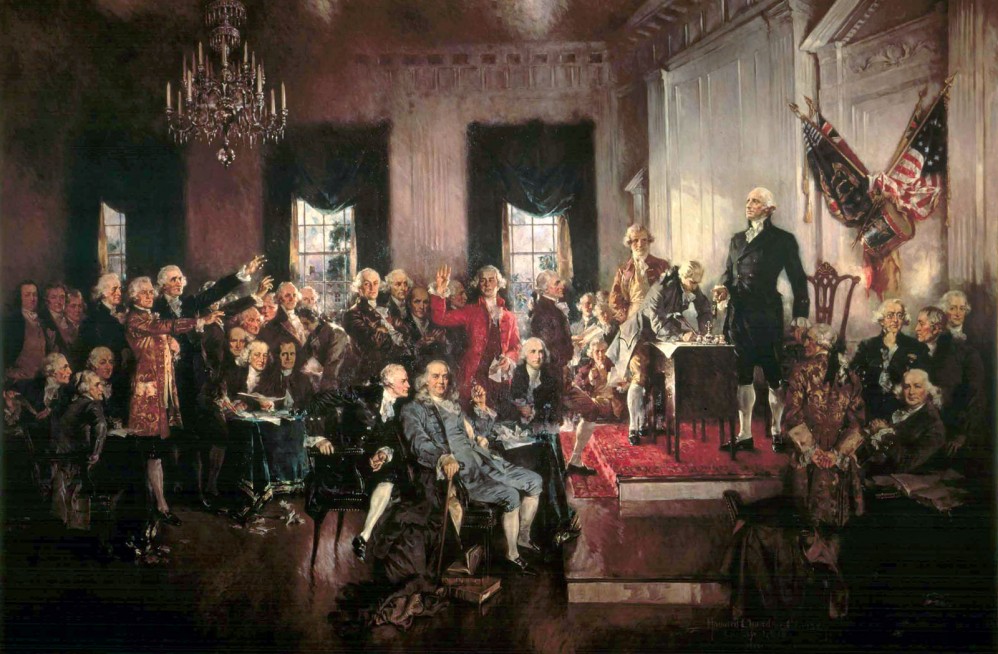
Firearms Owners Against Crime
Institute for Legal, Legislative and Educational Action

Institute for Legal, Legislative and Educational Action
The state isn’t here to give you everything you want—not even if what you want is extraordinarily popular with your fellow Americans. This is, no doubt, disorientating for voters who grew up believing they live in a “democracy.” In reality, our un-democratic constitutional bulwarks temper the vagaries of the majority. “Had every Athenian citizen been a Socrates,” James Madison quipped, “every Athenian assembly would still have been a mob.”

The left will mock you for making this obvious observation. Yet many progressives don’t seem to understand the distinction between united states and a united state. MSNBC’s Chris Hayes, for instance, recently took some heat from conservatives for claiming that the “weirdest thing about the electoral college is the fact that if it wasn’t specifically in the Constitution for the presidency, it would be unconstitutional.”
Of course, there’s nothing “weird” about diffused democratic institutions. There is nothing weird about arguing for federalism. These should be the foundation for every policy debate. Every governing institution in the country, to some degree, is counter-majoritarian. Quite often, the counter-majoritarianism is the entire point. Hayes is under the impression that “one man, one vote” means every ballot needs to be plugged into a direct democracy, which is absurd.
Hayes doubled down on “democracy” by arguing that “conservatism is a movement deeply paranoid and pessimistic about its own appeal, increasingly retreating behind counter-majoritarian institutions: the senate, the courts, the electoral college” and that it was “*deeply* revealing that the entire conservative movement gets #triggered if you say the simple truth about the electoral college.”
It’s not a simple truth, is it? For one thing, progressives increasingly view voting as the most sacred and determinative act of a citizen and see any counter-majoritarianism as unnatural and unfair.
One of these people is obviously Hayes. Otherwise, why frame reliance on the constitutional process—of all three branches, no less—as a “retreat?” If a person believes that “counter-majoritarian institutions” are a place to hide, it’s reasonable to conclude that he believes majoritarianism is the high moral ground; the best place to fight.
Sadly, few will properly argue that people are increasingly “retreating” into majoritarianism—although, in a constitutional republic, that would be a proper political insult.
Of course, it’s also true many of these political grievances are situational. Liberals had no problems with anti-majoritarianism when courts concocted a right to an abortion. It is only a problem for them when courts protect free speech or gun rights or stop partisans from coercing Americans to join their groups.
It’s only when Democrats lose presidential elections that “fixing” the Electoral College becomes imperative. It’s only when the Supreme Court skews towards originalism that we have to figure out a better way to appropriate Senate seats or pack the courts.
Still, the majoritarian instinct has always been stronger on the left. At one point it was driven by important notions of self-determination. Today, the post-liberal left sees “democracy” as a way to steamroll the knuckle draggers in compliance.
It’s no surprise, then, that Rep. Alexandria Ocasio-Cortez will openly grouse that “Republicans are now arguing that the US isn’t (& shouldn’t be) a democracy.” Ocasio-Cortez surely understands basic civics. She must know that a national “democracy” is far more likely to corrode the civil rights of individuals than are republican institutions. She must have learned that direct democracy encourages a mob mentality. Surely she understands that counter-majoritarian institutions, featured in every free nation, help restrain the worst impulses of partisanship and protect the nation from the whims of the electorate.
These are the reasons Ocasio-Cortez, and other progressives, supports majoritarianism. Without it, national socialistic projects like the Green New Deal can ever exist. They need a one-party system. Nothing relies more on emotionalism, scaremongering, and the “common impulse of passion” more than socialism.
One wishes Ocasio-Cortez took a more honest approach, like left-wing commentator Matthew Dowd, who recently came out against the Constitution (and Christianity, I guess?), arguing that “texts written 2000 years ago or 200 years ago should not control our ability to advance the human race and do what needs to be done in the 21st century to create a more enlightened community based in justice and compassion for all.”
Enduring notions about liberty and minority rights—due process, the right to free expression and self-defense, to name just a few—do nothing to inhibit technological, economic, or moral progress. The opposite, in fact. The history of the United States is proof.
Although some people will argue (even this atheist) that, in the long view, Christianity has done more to advance the human race than any other philosophy, no one is coercing anyone to participate in Mass. Dowd, on the other hand, believes all of us should be strong-armed into adhering to his enlightened ideas.
Dowd, in fact, is the kind of person the Constitution was written to stop. If his loaded contentions about “what needs to be done” to enforce his conception of “compassion and justice” are in conflict with the Enlightenment, they aren’t American ideals. They are something new. And, no doubt, Dowd, and others like him, believe themselves better equipped than Hamilton and Madison to determine how an “enlightened community” should be governed. Call me quixotic, but I remain skeptical.
https://thefederalist.com/2019/09/03/democrats-continue-turn-constitution/